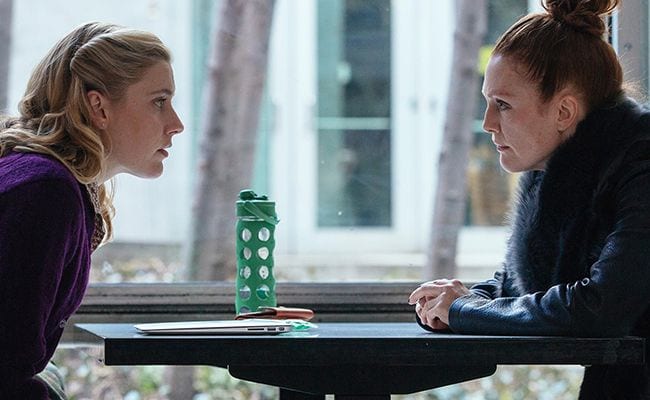
A romance of Manhattan manners, Maggie’s Plan should by all rights suffer from Woody Allen-itis. The clichés are all there: the academic backdrop, a protagonist yearning for creative and erotic freedoms, casual references to Slavoj Žižek, and a beautiful yet lived-in New York setting (all brownstones and parks, with hardly a midtown skyscraper to be seen). But writer-director Rebecca Miller’s easy hand on the tiller and a clutch of well-honed performances make this one of the sweetest, most genuinely satisfying romantic comedies to hit screens in some time.
Miller based her script on an unpublished novel by Karen Rinaldi, so there’s no way to tell how much of the Maggie (played by Greta Gerwig) we see comes from the source material. But her reliable earnestness and daffy perspective (which feels about ten degrees skewed from everyone else in the room) seems to be especially written for Gerwig.
When we first meet Maggie, she’s a sensible young woman given to pert sweaters and honest self-expression. She works at the New School as a kind of den mother to art students, trying to link their creative desires in some way with the workaday world so that they don’t end up homeless.
As must happen in romantic comedies, the put-together (heterosexual) heroine has bad luck with men: poor Maggie hasn’t had a relationship last longer than six months. She thinks she hears her biological clock ticking, which makes her increasingly anxious to find an acceptable mate. To Maggie’s mind, at once practical and utterly irrational, the only option is to get artificially inseminated by Guy (Travis Fimmel), a slack, pickle-producing hipster who doesn’t seem to have gone a day without smoking a bowl since 1997. She hears arguments against the plan from friends like Tony (Bill Hader) and Felicia (Maya Rudolph), but these mainly serve to provide the sort of slashing one-liners that the well-mannered Maggie wouldn’t say out loud.
The guy who throws everything into romantic disarray is John (Ethan Hawke). A specialist in “ficto-critical anthropology”, he’s one of the more roughish academics slouching around campus. For their meet-cute, John asks Maggie to read the novel he’s been working on. She loves it, and him. She’s as interested in the prospect of shoring up his messy insecurities as she might be in the man himself.

Problem: John has a wife, Georgette (Julianna Moore). She’s a sharp-elbowed academic whose default status is mother bear defending her cubs, only she’s forgotten where her cubs are, and that makes her even more infuriated.
It may sound like the setup for a monumental cat fight, but that’s not what Miller has in mind here. For one thing, the tussle between Georgette and Maggie is almost entirely one-sided: while Georgette goes off to write an acclaimed book about the affair that breaks up her family, Maggie just soldiers on, taking better care of John and Georgette’s kids than their parents ever did. For another, Moore’s fiercely committed over-the-top performance, accent courtesy of Bernadette Peters in Blazing Saddles and attitude by way of Tilda Swinton, is so fresh that Georgette never becomes the usual harpy.
By focusing on the fundamentally unselfish Maggie, and placing her between two self-centered egomaniacs, the film resists other conventions, too. The women might struggle briefly over a guy who seems less a prize the longer the story goes on, but we’re more interested in Maggie’s confused attempts to untangle her emotional desires from her determination to fix everyone else’s lives.
A crueler story might have made the Wisconsin-raised Maggie the butt of the joke, just another rube amongst the sharks. But while much of the comedy emerges from Maggie’s cluelessness, she’s treated almost as tenderly by the film as she is ultimately by John and Georgette. Seeded with jabs that mock academic pretense, Maggie’s Plan also approaches that milieu with some affection. “Ficto-critical anthropology” sounds at first like classically arcane ivory tower nonsense, and lines like “Nobody unpacks commodity fetishism like you do” provide a decent laugh for anybody with a liberal arts degree. But when John unspools what he’s writing about, it’s hard not to think you might actually want to read it.
In the same way, the sitcom-like plot turns that take over the second part of the film are funny and touching at the same time. Maggie’s Plan looks like the screwball comedy that Noah Baumbach has been trying to make with Gerwig. Both Mistress America and Frances Ha tilt toward this movie’s focus on questions of purpose and permanence in an uncertain age. With its brightly generous mood and assured feminism, Miller’s movie doubles down on the strength and resilience of its women. John’s purpose in the story isn’t beside the point, but what he does or approves isn’t what matters.


![Call for Papers: All Things Reconsidered [MUSIC] May-August 2024](https://www.popmatters.com/wp-content/uploads/2024/04/all-things-reconsidered-call-music-may-2024-720x380.jpg)



